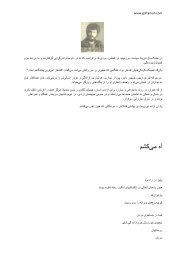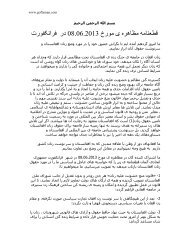Power-Sharing - Goftaman.com
Power-Sharing - Goftaman.com
Power-Sharing - Goftaman.com
- No tags were found...
You also want an ePaper? Increase the reach of your titles
YUMPU automatically turns print PDFs into web optimized ePapers that Google loves.
services, elections can lead to kleptocracy rather than democracy, and many Afghans fearthat this process is already under way.ResourcesAfghanistan has one of the weakest governments in the world. The InternationalMonetary Fund (IMF) estimates that the government revenue will total 5.4 percent ofnondrug GDP in 2005–2006, less than any country with data. Furthermore, theadministration has difficulty disbursing the funds it has: the ten poorest provinces receivethe smallest budgetary allocations, leading to nonexistent government presence andrampant security problems. 21Attempts to raise domestic revenue are stymied by the lack of control over thecountry’s borders, the small portion of the economy in the formal legal sector, and theweakness and corruption of the administration, particularly in tax collection. Currently,would-be tax payers are discouraged by collectors, who suggest they pay bribes instead.The Afghanistan Compact requires the government to raise domestic revenue toover 8 percent of GDP by fiscal year 2011 and to be able to cover 58 percent of therecurrent budget with its own resources, <strong>com</strong>pared to 28 percent in fiscal year 2005.Nonetheless, escalating costs of security and civil service reform will make these targetsdifficult to achieve.Re<strong>com</strong>mendations:• The Coalition and Afghan government should support continuing fiscal reform,including ISAF and Coalition military deployments in support of control ofborders (for revenue collection) and state banks (for expenditure). Thegovernment should rationalize the procedures for business taxation, abolishnuisance taxes, and find other ways to tax the expenditures of the international21 Ashraf Ghani, Clare Lockhart, Baqer Massoud, and Nargis Nehan, “Public Finance in Afghanistan: TheBudget as the Instrument of State-Building and Policymaking,” in James Boyce, ed., Peace and the PublicPurse: Building State Capacity after Violent Conflict (New York: Center on International Cooperation,forth<strong>com</strong>ing).26
















